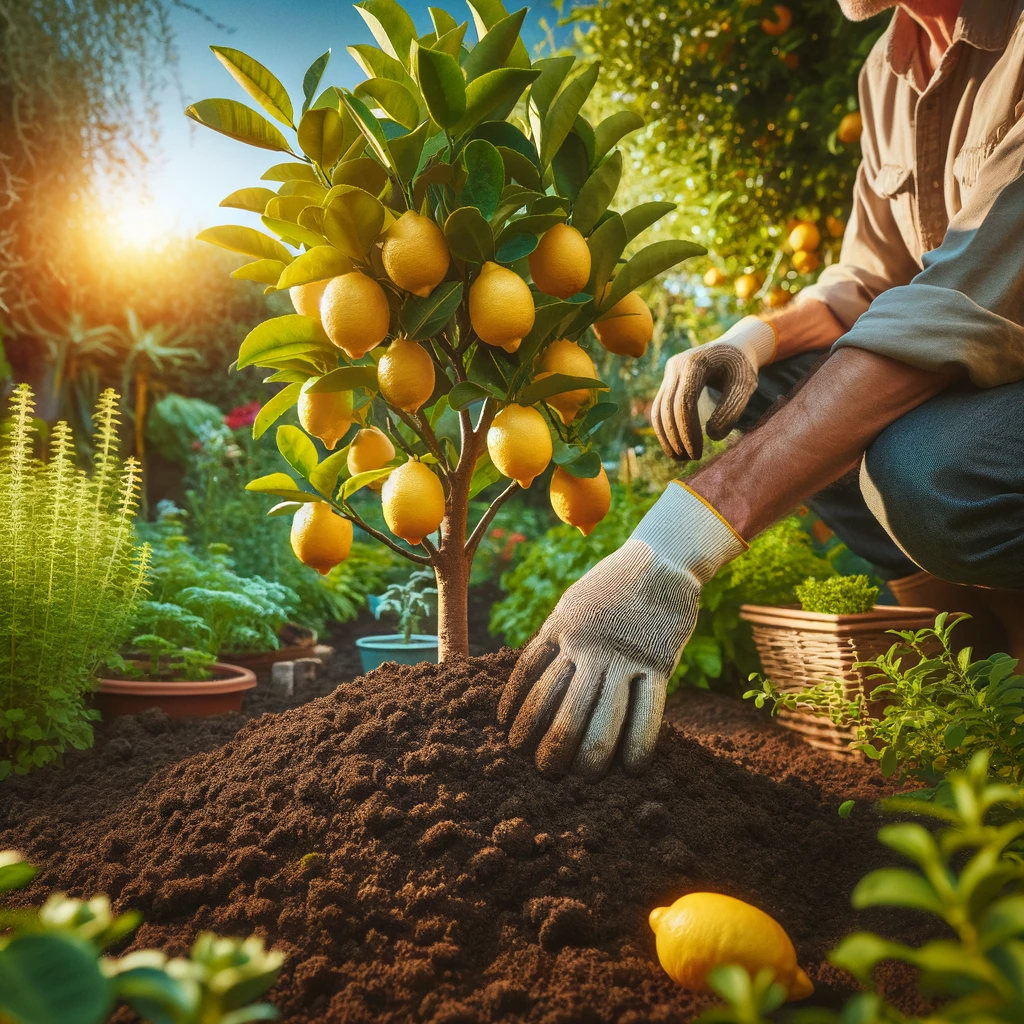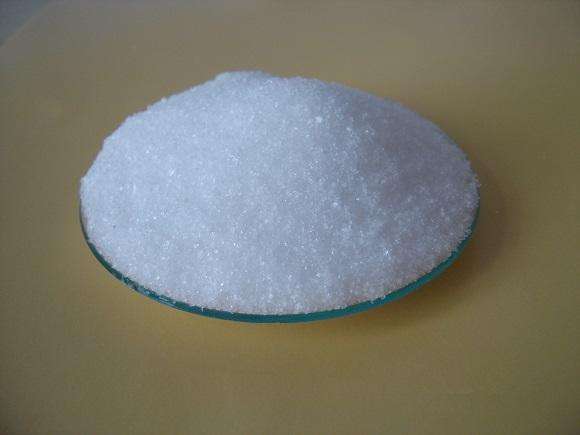Introduction to Organic Fertilization for Lemon Trees
Given the additive benefits of using organic fertilizer versus chemical alternatives, it’s no surprise that organic fertilizer for lemon trees is the fertilizer of choice for a good number of gardeners and agriculturalists. Organic fertilizer for lemon trees releases nutrients slowly to foster a consistent all-around growth. This replenishing cycle replicates how plants organically grow in most natural forests: Getting nutrition from nutrients in decomposing organic waste.
The main difference is that in using organic vs synthetic fertilizers, you are adding nutrients to the soil and a different one will change the soil structure and your healthy bacterial friends. Organic soil fertilizers are produced from natural substances such as plant residues or animal manure, and contribute to soil structure improvement, microbial activity and soil fertility in the long-term. Synthetic soil fertilizers are chemically synthesised and significantly reduce soil health by decreasing its ability to retain water, oxygen and air.
The infusion of organic manure into the soil also helps bolster the viability and sustainability of the citrus grove, says recognised horticulturist Dr Lucy Green. ‘There are lots of plant nutrients in organic fertilizers that help us in maintaining a sustainable type of agriculture; and healthy soil is important for longterm citrus production,’ she said.
With these basic facts in mind, growers can plan their use of fertilizers in order to promote the health of their lemon trees and a healthy farming environment. In this guide, we delve more deeply into the nutritional requirements of lemon trees, the organic options for fertilizers, and how they can be chosen and applied.
Understanding Lemon Tree Nutritional Needs
A lemon tree, like any other citrus tree, needs a high range of nutrients to grow well and make good foliage and fruit. The organic fertilizer for lemon tree needs to contain a mix of essential nutrients: nitrogen (N), phosphorus (P), potassium (K) – what’s known as NPK – a combination of macronutrients consisting of the three main elements – along with a suite of micronutrients such as magnesium (Mg), zinc (Zn) and iron (Fe).
Meanwhile, nitrogen helps to spur leaf growth with vigour, and is a key ingredient in chlorophyll, which is what makes photosynthesis happen. Anyone with a yard who can’t tell one plant from the next immediately knows what nitrogen deficiency looks like: yellow leaves, and slow growth. Phosphorus spurs healthy root growth, allows for strong stems, and is crucial for flower development, which in turn impacts yields. Potassium, meanwhile, improves a tree’s ability to survive, and is crucial for water management, a plant’s first line of defence.
Symptoms of nutritional deficiencies in lemon trees differ but are usually visual (as is evident by the name) so that treatment can be applied quickly:
The lack of nitrogen will cause overall chlorosis (yellowing, or even pallid, of foliage) and reduced leaf size.
The telltale signs of phosphorus deficiency are short stature in trees and a darkening of leaf tones, sometimes with a purple hue showing though the underside of leaves.
Just as low calcium causes multiple symptoms, potassium deficiency can be diagnosed by identifying leaf scorch, where the colour of the leaf margin turns yellow or brown, and curling of the leaves is a possibility.
According to Lucy Green, a citrus nutrition expert at the University of Florida, who’s familiar with the lemon trees in Florida, it would be beneficial to use organic fertilizer for lemon tree: because it not only helps satisfy nutrient requirements of lemon trees but also contributes to the fertility of soil by improving soil health and structure, hence enhancing the soil’s water-holding capacity. Soil tests should be conducted annually to evaluate and diagnose nutrient status accurately, and thus improve fertilisation input.
Once we know the specific nutrient requirements and most common deficiency symptoms of lemon trees, we can employ the lemon tree organic fertilizer. Using organic fertilizer for lemon trees is the best way to the maintenance of their good health, as well as optimizing the yield of their product, the fruit. Up to this point, the lemon trees are not just kept alive, but also to preserve a good and healthy condition with a watchful eye and appropriate mineral nutrition.

Types of Organic Fertilizers for Lemon Trees
In this essay, I will examine types of organic fertilizers, which can help people know about the different kinds and help them select the best one for their lemon trees. Organic fertilizers are made from natural sources, which are used extensively in farmers’ agriculture. We can say that these materials play a significant role in soil purity and plant health, also these materials help farmers to use sustainable techniques in agriculture to provide food for consumption based on the below-mentioned types:
Main Types of Organic Fertilizers Suitable for Lemon Trees:
- Compost: Compost is one of the best organic fertilizers one can have and is made using kitchen scraps, leaf litter, lawn clippings, and other organic waste. It improves soil structure, increases moisture-holding capacity, and releases nutrients slowly. Compost, in particular, is a rich source of nitrogen, and nitrogen is extremely important for the lush vegetative growth that lemon trees need. “The lemon trees aren’t just being fed, the soil is being fed,” Dr. Lucy Green said.
Animal-based Organics:
- Bone Meal: A good source of phosphorus, bone meal gives lemon trees healthy roots and flowers, which in turn results in more fruit.
- Blood Meal: Providing an extra boost of nitrogen, blood meal can help young trees grow their leaves fast. Excellent application for landscape trees that were just transplanted or pruned.
- Fish Emulsion: The perfect balanced fertilizer or at least high in nitrogen and trace amounts of all the other nutrients. Perfect for a nutrient boost. The plant absorbs it quickly.
Plant-based Organics:
- Cottonseed Meal: Releases slowly and is acidic. Useful for lemon trees that prefer acidic soil. Nitrogen is the primary nutrient followed by phosphorus and potassium.
- Alfalfa Meal: Alfalfa is probably most useful in the garden for its nitrogen and potassium content as well as an important conditioner of your soils for future fertility.
- Seaweed Extracts: They contain not only trace minerals but also hormones beneficial for plant growth and disease resistance, generally used as a supplemental fertilizer to enhance general vigor and fruit quality.
Choosing an appropriate organic fertilizer to create the best growing conditions for lemon trees is recommended. In particular, the current nutrient status of the tree, the soil pH, and the growth season of the tree are all considered to be of importance. Dr. Green says: “In order to manage citrus crops appropriately, it is important to consider the age of the tree and its current health status, as well as what the local soil conditions may dictate.”
How to Choose the Right Organic Fertilizer for Lemon Trees
Selection of the appropriate fertilizer for lemon trees entails careful consideration of factors that affect both the health of trees and the quality of fruits produced. Factors to consider when selecting an organic fertilizer or organic farm fertilizer product include the nutrient needs of lemon trees as well as the ecological conditions and characteristics of the site where the lemon trees are to be planted. Key considerations include:
Nutrient Ratio
To get the most out of the fertilizer, the N-P-K ratio (nitrogen, phosphorus, potassium) must match the growth stage and nutritional needs of the lemon trees. Younger trees would require more nitrogen content to spur foliage and root development, while mature trees would benefit from a balanced mix that supports fruiting and general health.
Soil pH Compatibility
Lemon trees favour slightly acid soils with a pH of 5.5 to 6.5. Any organic fertilizer used should, again, either help keep or adjust the pH of the soil to a range of 5.5 to 6.5 to promote optimal availability and uptake of nutrients. For instance, cottonseed meal is considered acidic and can lower pH in excessively alkaline soils.
Application Method
fertilizer delivery method impacts both the efficiency of fertilizer application and the tree’s ability to use the nutrients. Graded granular fertilizer can be broadcast at a market-guideline rate around the drip line. Liquid fertilizers can either be placed on the foliage or into the soil. Compost can be directly incorporated into the soil. There is no universal recommendation for any one method, so you are left to choose the one that is easiest for you and works for your orchard based on its conditions.
Tailoring Choices Based on the Tree’s Growth Stage and Health
The amount and the nature of nutrients necessary for successful lemon trees can change greatly depending on what part of its life cycle the tree is in: a young sapling will need certain nutrients to promote vegetative growth while a tree bearing fruit needs more potassium and phosphorus to fruit the tree. Further, the overall health of the tree can dictate whether or not micronutrient elements like magnesium or iron are needed to correct or prevent deficiencies.
and Dr Lucy Green adds:It’s a process that has to be adapted as your lemon trees grow and mature, changing their irrigation and nutrition needs over time. Soil tests done on a regular basis can give a very detailed breakdown on what nutrients are lacking and help fine-tune the fertilizer programme accordingly.
With this background, we hope growers consider each of these factors to choose the proper organic fertilizer for their lemon trees, so the tree can get the proper nutrients in the proper time and grow well and product more fruits. This will not only guarantee the quality of the produce but also the sustainability of the agricultural practice.

Application Tips for Optimal Results
Choosing the right organic fertilizer for lemon trees and using it properly is just as important as actually choosing an appropriate type. Fertilizing your lemon trees properly will ensure that they receive the right amount of nutrients, which can contribute to their growth, health, and overall productivity. Here are some recommendations on how to apply organic fertilizers to lemon trees.
Best Practices for Applying Organic Fertilizer to Lemon Trees
Spring/Summer: The ideal time to fertilize your lemon tree is during spring, right at the beginning of its growing season. Once your lemon tree begins to grow again, fertilizer will give it assistance to grow to its maximum potential. It is best to start fertilizing after the spring rains subside to prevent nutrient runoff. A good rule of thumb is to fertilize every three to four weeks during the most active growing season – from spring through the summer until the end of September.
Fertilizing in late fall and winter will not provide actual benefits, as lemon trees are dormant. By this time, they are naturally reabsorbing the fertilizers you applied in the spring. Anything that you add to the soil now will end up being washed away and wasted.
Method of Application: Fertilizers in granular form and liquids form (or compost) can be used. Granular fertilizers should be spread out in a circle around the trunk of the tree, as far as the drip line, which is the outer circumference of the tree’s spread when one drops water on the leaves. Liquid fertilizers can be diluted and used as foliar spray (spraying on leaves) or soil drench (permeating into the soil).
Amount of Fertilizer: Follow the manufacturer’s directions and use the suggested amount of fertilizer. Too much fertilizer, as with other nutrients, can cause imbalances, potentially burning the roots and damaging the tree. “In my experience, it is better to underfeed than overfeed,” says Dr. Lucy Green. “Often the maturity and response to fertilizer will let you know if extra fertilizer should be added.”
Adding Compost: Add 2 to 3 inches of compost around citrus tree trunks as a slow-release source of nutrients, to improve soil structure, and to improve moisture retention. Compost spread around the drip line of a citrus tree will nourish the soil without risk of burning the roots.
Seasonal Fertilization Strategies
Cropping can be increased and fruit quality improved, in accordance with the seasonal needs of the lemon trees, by modifying the fertilization programme.
Spring: Increase nitrogen-rich fertilizers to support new growth and flowering.
Summer: Work in a balanced fertilizer (a complete one with everything needed for fruit production) at the base of your plants.
When the leaves begin to change and fall: Increase the phosphorus-potassium ratio to replenish the trees for winter and to help them to continue to grow in the new season.
Through careful rationalization, such management is designed to supply the lemon trees with the basic nutrition they need to maximize their health and production at intervals throughout a year.
With these application tips, and with seasonal adjustments in strategy, citrus growers can enhance the synergistic effects of organic fertilizers to make for healthier trees and more abundant, high-quality fruit.
Troubleshooting Common Issues with Organic Fertilizers
With good management practices for using organic fertilizer for lemon trees, problems can still arise; and it’s crucial that growers recognize them early – over-fertilization and environmental stress and how to deal with them. Below are some common problems with organic fertilizers and solutions.
Over-fertilization Symptoms and Management
Symptoms of Over-fertilization:
- Leaf scorch (or tip burn) has the edges of leaves turning brown and shriveling up.
- Excessive growth of foliage with poor fruit production.
- Salt build-up in the soil, which can prevent the tree from taking up water, adding additional stress to the tree.
Management Strategies:
- Reduce the amount of fertilizer applied less often. Trees should be fertilized in accordance with soil test recommendations and based on good tree health assessments.
- Increase watering to encourage the leaching of salts from the soil – but, don’t overdo it, as this will introduce new problems such as root rot.
- Practice crop rotation to reduce salt buildup in the soil, and use soil amendments such as gypsum to help break apart the soil structure and enhance salt leaching.
Adjusting Fertilization Tactics in Response to Environmental Stressors
In years when the environment – especially drought-like conditions – creates unusual stresses on lemon trees, including days of extreme temperatures, high winds, or sudden changing weather, data might indicate fertilization tweaks so that the trees don’t end up with toxic levels of nutrients from the same fertilization regimen the crop has always had.
Adaptation Tips:
- If the trees are suffering during a drought, cut back on nitrogen-rich fertilizers that can promote growth the trees can’t support with limited water resources.
- In excessive heat periods, fertilizers applied in the cooler periods of the day will minimize volatilization (loss as gases) and stress to the trees.
- After high-wind events, which can dislodge leaves and break branches: Spread a balanced, slow-release fertilizer to support recovery but not promote excessive new growth.
By being aware of these common pitfalls and taking appropriate remedial measures, growers can continuously use organic fertilizer in the lemon tree to produce a healthy yield without contributing to the stress in the tree, even under the most undesirable conditions.
Conclusion
A successful use of organic fertilizer for lemon trees isn’t just about choosing the right product but an understanding of how these initiatives are tailored to consider the different developmental stages of trees, their environment and relating to specific soil properties. Understanding how fertilisation can be made responsive to the developmental stages of lemon trees can help the grower to develop a sound use of resources, avoiding practices that induce soil depletion and chemical accumulation (over-fertilisation), as well as those that cause environmental stress for the plants and unhealthy crops.
But also to encourage continual learning and adaptation of organic fertilisation practices. Lucy Green writes: Whatever you might think your trees need, or what you’ve learned from your neighbours or what worked for your oranges last season, your lemon trees will require you to listen to them and experiment with your application because trees grow and change in response to their environments. Adaptation of cultural practices to the needs of a crop and of individual trees … does not just help growers improve the management of their current crops. It prepares them better for the challenges of agricultural production in the future.
And the result, as for the olive trees, is definitely worth the effort: the journey of learning how to use organic fertilizers for the lemon trees is long, but the reward might be that of a more and bigger healthy fruit. The idea that every agricultural growing system has to be adapted to its environment and the seasonal variations is a suitable model to which every lemon grower has now to adapt. If they continue to do so, both their orchard and their product could easily share the expected bright future of the self-diversification path.
Here are some relevant references:
- The University of Arizona provides insights into the general requirements and recommendations for fertilizing citrus trees, emphasizing the importance of nitrogen in citrus health in desert soils.
- The University of Florida’s EDIS publication on Florida Citrus Production Guide offers extensive details on nutrition management for citrus trees.
- Another comprehensive guide from the University of Florida (EDIS) provides in-depth information on different fertilizer sources and formulations for citrus trees.







